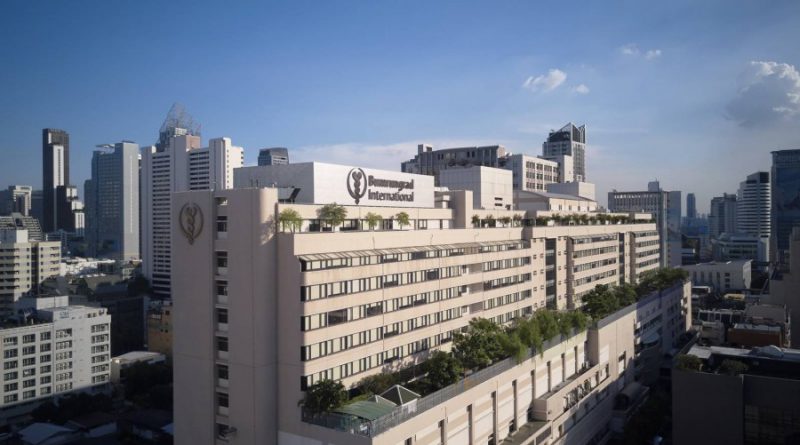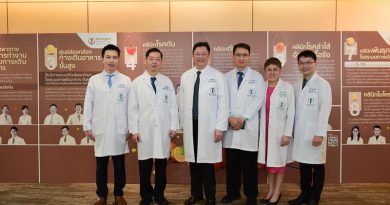Statement from Bumrungrad International Hospital
To the Editor-in-Chief
We are writing to address the recent article titled, “Bumrungrad in Trouble! Oil Tycoons Disappear” (June 10, 2025). While we respect the role of the media in informing the public, we are concerned that the article contains factual inaccuracies and omits crucial context that misrepresents both Bumrungrad’s position and Thailand’s healthcare landscape.
For 45 years, Bumrungrad International Hospital has been a leading destination for patients from over 190 countries seeking high-quality, ethical, and personalized care. Each year, more than 1.1 million patients and their families choose Bumrungrad, placing their confidence in our clinical expertise and patient-first approach. This enduring trust has earned us global recognition, including being Thailand’s only hospital ranked among the world’s best by Newsweek for five consecutive years, along with numerous international accreditations and accolades.

Sustainable Growth and Diverse Patient Base
The article’s claim regarding declining Middle Eastern patient revenue lacks critical context. Contrary to the implied downturn, our 2024 net revenue from Middle Eastern patients grew 45% compared to pre-pandemic (2019) levels, demonstrating the resilience of our subspecialty care model and the desire of patients to seek care with us. Notably, revenue from Qatar alone surged 558% in the same period—a testament to enduring trust from the region.The article claimed that the hospital lost more than 1.3 billion THB in INCOME over the past nine months of 2024. The statement is also incorrect. In reality, the loss of Middle Eastern REVENUE—including Kuwait—amounted to 551 million THB during that period, primarily due to domestic policy reforms in Kuwait, not service or quality. THE COMPLETELY UNINFORMED AND NAIVE COMMENT LACKS AN UNDERSTANDING THE DIFFERENCE BETWEEN REVENUE AND INCOME. Moreover,this impact was fully offset by growth from other Middle Eastern and international markets, as reflected in our year-over-year EPS. Furthermore, contrary to the article’s assertion of “zero” Kuwaiti patients, approximately 30% have returned to receive care at Bumrungrad in 2024, contributing 416 million THB in revenue. Patients from Qatar and the UAE also continue to seek treatment at Bumrungrad, particularly for complex and specialized care.The article also overlooks our diversified patient base, which spans over 190 nationalities. We continue to see strong demand from Thai and expatriate patients, as well as from Cambodia, Laos and Myanmar and other international markets. In 2024, revenue from Thai patients grew by 46% and from expatriates by 56%, compared to 2019. This growth is particularly notable in high-acuity specialties, wellness, and preventive care—areas that require advanced expertise and intelligence, where Bumrungrad continues to lead.
Also we wish to clarify that it is inappropriate to discuss Q2 2025 revenue figures at this stage, as premature release could mislead investors and violate compliance rules. What we can say is that we continue to focus on doing our best for patients—and that commitment drives our consistent growth across key markets. Bumrungrad’s focus is—and always has been—on delivering safe, high-quality, patient-centered care. We believe that when clinical outcomes and patient experience come first, sustainable growth follows—regardless of geography.
Our achievements would not be possible without the deep commitment of our physicians and clinical teams, who are at the forefront of diagnostics and treatment. Patients consistently choose Bumrungrad for specialty care because of our well-trained medical professionals and the excellence of our clinical and non-clinical employees who deliver care with compassion and integrity.
Pricing vs. Value Proposition
The article’s comparison of basic health check-up packages is factually incorrect. Our entry-level package starts at 7,000 THB—not 16,100 THB as stated. This discrepancy calls into question the accuracy of the article’s analysis, particularly when check-up packages differ substantially across hospitals in scope and design.
In fact, check-up prices across hospitals cannot be directly compared, as each institution designs packages based on its clinical capabilities, technologies, and patient focus. Even similarly named packages—such as basic, regular, or comprehensive— differ significantly in diagnostic scope, tools used, and medical expertise. For example, Bumrungrad includes in some packages advanced modalities like AI-powered photon-counting CT, a cutting-edge technology that delivers higher resolution with lower radiation exposure. This allows for earlier and more accurate detection of potential health issues—underscoring our commitment to precision and proactive care.
More importantly, drawing conclusions based solely on basic check-up package prices—then labeling Bumrungrad as significantly more expensive—overlooks the depth, quality, and complexity of care we provide across other dimensions. Hospitals differentiate themselves through unique value propositions, clinical capabilities, and specialized expertise. While the article focuses on price as the main reason for patient migration, it fails to consider the broader value that draws discerning patients: advanced medical expertise, a strong track record in complex and critical care, proven outcomes, and highly personalized services. These elements create a higher perceived value for many patients. While some may prioritize affordability, others—including the majority of our Middle Eastern patients—choose Bumrungrad for the value, excellence, and strong commitment to care.
In continuously improving these standards, Bumrungrad benchmarks itself against the world’s leading healthcare institutions—and frequently exceeds international benchmarks for clinical quality and outcomes.
The article’s generalizations about “affluent Middle Eastern patients” also overlook the diversity of medical needs, cultural preferences, and expectations that shape their healthcare decisions.
Resilience and Future Growth
Bumrungrad has successfully navigated over four decades of global and domestic challenges by staying focused, vigilant, and committed to delivering the best for our patients. We continuously monitor shifts in the competitive landscape, geopolitical developments, and emerging trends—including the rapid advancement of medical intelligence and AI—to ensure we stay ahead. Far from being complacent, we remain agile and responsive—ready to adapt and act where opportunities align with patient needs and long-term resilience.
A clear example of this is our proactive engagement with the Thai-Saudi CCHI framework. Recognizing the potential of this evolving partnership, we were invited to present at a wellness seminar in Riyadh, and we are now in advanced discussions to serve insured Saudi patients—an initiative expected to contribute meaningfully to our long-term strategic growth while further diversifying our revenue base.
Ultimately, while we welcome public interest and constructive dialogue, the article’s claims regarding Middle Eastern patients, financial assumptions, and price comparisons do not fully reflect the complexity of the healthcare business and the broader context in which we operate. There is no factual basis for linking our stock performance to the assumptions presented in the article—doing so reflects a logical fallacy that ignores Bumrungrad’s strong fundamentals, global reputation, and proactive strategies for long-term resilience. we remain committed to transparency and to the long-term well-being of the communities we serve.
Sincerely,

Napas Paorohitya
Chief Marketing Officer
Bumrungrad International Hospital




